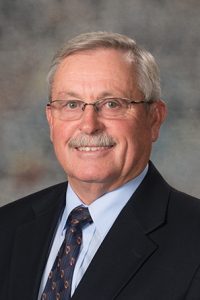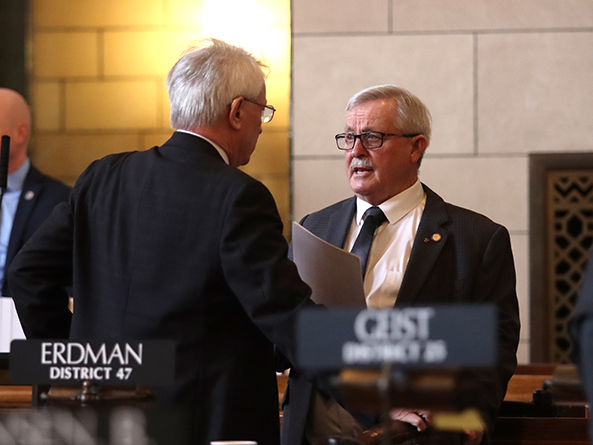Senators approve legislative rule change
Lawmakers approved a change to the Legislature’s rules March 28 that limits the options available to senators to extend debate for the remainder of the legislative session.

Sen. Steve Erdman of Bayard, chairperson of the Rules Committee, offered a motion to suspend the rules of the Legislature to provide that, for the remainder of the current session, only one of the following motions on a bill or proposal could be offered on the same day at the same stage of debate: to commit; postpone to a later date certain; or indefinitely postpone.
The three procedural maneuvers are known as “priority motions” because they take priority over amendments and automatically move the introducer of the motion to the top of the speaking queue. The tactic was used by opponents of LB574 — a bill from Omaha Sen. Kathleen Kauth to ban gender-altering care for minors — to control debate in the run-up to a cloture vote that successfully brought that bill to a vote March 23.
Omaha Sen. Machaela Cavanaugh opposes Kauth’s bill and has engaged in extended debate during consideration of unrelated measures since early in the legislative session in response to it. She stated her intention to continue to do so on all bills up for debate this year after LB574 advanced to the second round of debate. The proposed rule change would not impact that decision, she said.
“This changes nothing for me,” Cavanaugh said. “This doesn’t inhibit my ability to do anything that I am seeking to do.”
Erdman said the rule change would represent a balance between allowing members of the political minority to express their views and allowing the Legislature to work efficiently. He said all lawmakers have bills that they care about that might not be discussed during the 90-day session if extended debate continues on all other measures.
“It is time for us to move on. I think this … is a fair rule change, so we can have full and fair debate on the bills as presented and move forward with doing the work that the people sent us here to do,” Erdman said. “If you like the way things went in the first 50 days, you’ll vote against this rules change.”
Several senators who supported the motion mentioned their constituents’ frustration at the pace of debate this session, including Elkhorn Sen. Lou Ann Linehan. The state has over a billion dollars in surplus, she said, and lawmakers could use that money to cut taxes and provide more funding to rural schools and special education — but only if those proposals come up for debate.
“I want to get some things done this year,” Linehan said.
Sen. John Arch of La Vista, Speaker of the Legislature, also supported the change. Acknowledging that debate has been “reduced to a crawl,” he said progress in the second half of the session was up to members, adding that he would “love” to find a compromise.
“It’s all of our choice what we want the rest of the session to be,” Arch said.
An effort by Omaha Sen. Justin Wayne to have the rule change motion ruled out of order was rejected by the presiding officer, as was his subsequent motion to overturn that ruling, which failed on a 16-32 vote.
Wayne said the rules of the Legislature do not allow those rules to be both suspended and amended at the same time, and that Erdman’s effort should have been done through regular channels. He said he understood lawmakers’ frustrations, but likened the proposal to changing the rules of a basketball game at halftime because one team doesn’t like how the game is being played.
“My entire legacy might not even be [debated] this year,” Wayne said. “I need to get stuff done, but there is a proper way for this body to do it.”
In opposition to the Erdman proposal and in support of Wayne’s motion, Lincoln Sen. Danielle Conrad called the rules change a “nuclear option.” Removing the need for a public hearing on a proposed rule change easily could lead to the removal of other tools that senators on the minority side of issues use to attempt to structure debate, she said.
“Be honest about what your intentions are,” Conrad said. “Because it’s not about the priority motions and it never was.”
Bennington Sen. Wendy DeBoer also supported Wayne’s motion. She said a process exists to change the rules — even mid-session — by going through the Rules Committee and having a public hearing. DeBoer said she didn’t oppose the underlying rule change, but rather the process being used.
“We can change the rules if we do it the proper way,” she said. “If we can just do it this way, why would we ever use the proper channels to amend the rules?”
The motion to suspend the rules was adopted 32-13. Thirty votes were required.


